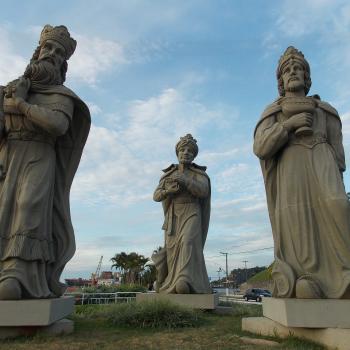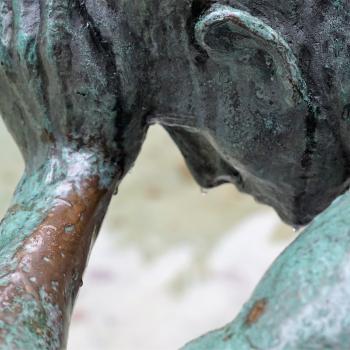
At home in my dresser upstairs I have a wee yellow sock, about four inches long. Just one. Downstairs I have a drawer in the laundry room full of single socks, which, despite my husband’s indictment, do not lose their partners through any collusion on my part. Those socks are casualties of clothes-basket subterfuge, a mangled mêlée that always takes place in the dead of night when no one is looking. Those socks always retain some vestige of hope – perhaps their mates will reappear; perhaps they will be worn again; perhaps, even, they will become useful as rags. But the one upstairs? Something else entirely. It has no suspended purpose. It has no “future.” This, however, makes it not less valuable, but more.
Whoever said that relics were things of ancient history? They linger in remote corners of my house, throwing off random sparks of memory whenever I come across them. I have them tucked here and there — the old game Operation, missing a bone or two; a tattered copy of Bears in the Night; a little baggie full of church drawings by a certain 4-year-old… I’m not really the nostalgic sort, so the glimmers are not fraught with sentiment or wistfulness; they are merely reminders of what was, and that what was, was very, very dear.
Perhaps when we think of relics we imagine the creepy bones and leathered skin of some long dead saint under glass cases, or minuscule slivers of the True Cross embedded in a gilded frame. Perhaps we think of the Shroud of Turin or even the elusive Holy Grail. Today we’re seeing a new kind of relic: remnants from the World Trade Center, some of them controversial in their shape or usage, shipped around the world for people to see.
But why? Why relics? What do they do for us? What are we clinging to? Or are we clinging?
For some, they are lightning rods of purpose and identity. St. Peter’s Chains, housed in a golden case, backlit and silent, may speak to the triumph of the Christian faith, freed from political chains and released by martyrdom to conquer the world.
For others, relics offer a supernatural connection to the immensity of mystery. The Chains may retain a whiff of the saint’s sanctity, and molecules of holiness seep through the glass to rest on the pilgrims.
My little sock? No whiffs of anything; no lightning rod of meaning. A little sock, whose partner is long gone, which will never be worn again. A little sock that wouldn’t now fit on two fingers of the child who once wore it. A sock that remains, for a while, in my drawer but will someday inevitably be lost or thrown out. A sock that has meaning to no one but me.
Here I am, a historian; a student of the past, a lover of old stories and lost people and dusty words. And an occasional relic-titian.
And in pondering the little yellow sock, I see it for what it is: a corporeal symbol of a now-elusive, but just as authentic, immaterial reality, the reality of my children’s childhood, a time of blessing and joy. If, as Jesus insisted, Abraham, Isaac, and Jacob are alive to God, and if, as Paul wrote, the day will come when all things in heaven and on earth are gathered together under one head, then certainly the holy and wonderful things or times or people or circumstances we have lost, which have passed away and are passing away with each morning and evening, are not lost, but being gathered, like ripe fruit fallen from the tree. They are all present to the One who is himself always present; they are lost to me, but not to him. And the harvest awaits us – not the return of the old or the restoration of the past, but the fullness of the goodness they embodied.
We all will, of course, eventually lose everything. That should not depress us or frighten us (though it does) as much as help us to turn our eyes off the falling fruit and toward the in-gathering, when all its richness will be once again be given. To receive blessing and then to let it go – this is the stipulation of grace.
And the relic? The itty-bitty sock? For a while, it reminds me – it is no longer useful for anything but turning my heart.












